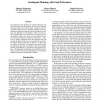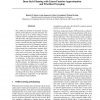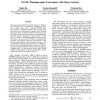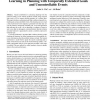143
Voted
AIPS
2004
15 years 4 months ago
2004
The planning as heuristic search framework, initiated by the planners ASP from Bonet, Loerincs and Geffner, and HSP from Bonet and Geffner, lead to some of the most performant pla...
102
Voted
AAAI
2006
15 years 4 months ago
2006
The importance of the problems of contingent planning with actions that have non-deterministic effects and of planning with goal preferences has been widely recognized, and severa...
146
Voted
AAAI
2006
15 years 4 months ago
2006
Temporally extended goals (TEGs) refer to properties that must hold over intermediate and/or final states of a plan. The problem of planning with TEGs is of renewed interest becau...
122
Voted
AAAI
2004
15 years 4 months ago
2004
In many real world planning scenarios, agents often do not have enough resources to achieve all of their goals. Consequently, they are forced to find plans that satisfy only a sub...
146
Voted
UAI
2008
15 years 4 months ago
2008
We consider the problem of efficiently learning optimal control policies and value functions over large state spaces in an online setting in which estimates must be available afte...
113
Voted
IJCAI
2007
15 years 4 months ago
2007
In this paper we propose a suite of techniques for planning with temporally extended preferences (TEPs). To this end, we propose a method for compiling TEP planning problems into ...
109
Voted
AAAI
2010
15 years 4 months ago
2010
Planning in large, partially observable domains is challenging, especially when a long-horizon lookahead is necessary to obtain a good policy. Traditional POMDP planners that plan...
127
click to vote
ECAI
2008
Springer
15 years 4 months ago
2008
Springer
Recent contributions to advancing planning from the classical model to more realistic problems include using temporal logic such as LTL to express desired properties of a solution ...
142
Voted
ATAL
2008
Springer
15 years 4 months ago
2008
Springer
Multiagent environments are often highly dynamic and only partially observable which makes deliberative action planning computationally hard. In many such environments, however, a...
124
Voted
WSC
2008
15 years 5 months ago
2008
The requirements on production systems and their planning and control systems are constantly growing. Systems have to be flexible and provide viable solutions at the same time. Di...




